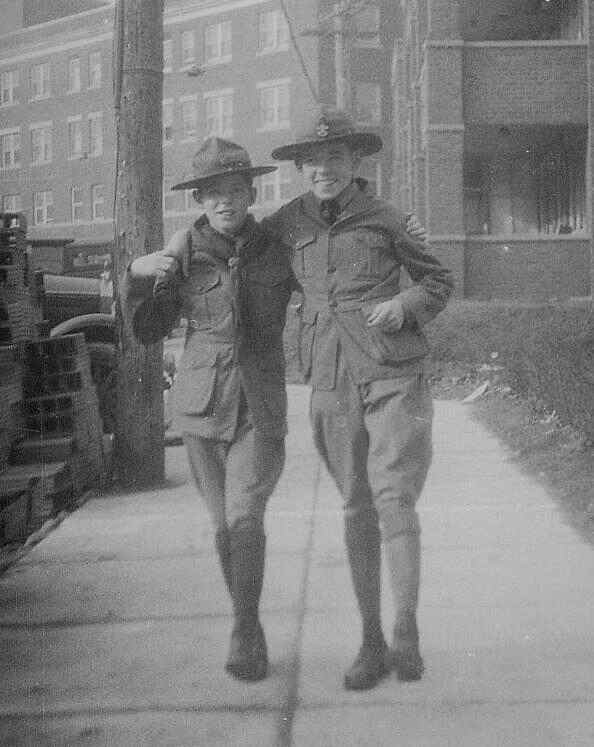
United States Boy Scouts: Paradox

Figure 1.--Here we see two chums, probably in the late 1920s, on their way to a Scout meeting. The Boy Scouts is the most important youth movement in America and has played a role in te lives of millions of boys. It has not, however, been the subject of extensive scrutiny.
|
|
Despite the importance of the Boy Scouts in America, the Scouting movement has not been the subject of extensive academic analysis. Many scholars have not considerd it of sufficent importance. There has been a great deal written about Scouting, but mostly self-congratulatory tomes from within the movement. One scholar who has published an insightful analysis writes, "Among established American institutions, few have been more successful or paradoxical than the Boy Scouts of America. Here is an organization patterned after the ideas of a British general, a highly bureaucratic institution that, for
more than seventy years, has attempted to build character among middle-class adolescent American boys through adult-supervised badge-winning and camping. Professing class-less values, it has drawn its strength from white, Protestant, middle-class society. Enormously appealing to adults, the program has generally failed to hold the interest of boys for more than a few years - and yet the BSA burst upon the American scene in a blaze of success early in the (twentieth) century, and to this day, while its teachings may seem naive and outdated, it enrolls millions of boys in every part of the country." [Macleod]
A reader writes, "Interesting comments on the popularity of the Boy Scouts. We still get accounts in our local newspapers about boys who make it to the rank of Eagle scout, and they are usually much admired and have ther pictures taken in uniform. But there is now a strong condemnation of the Boy Scouts in intellectual circles and universities because of their exclusion of boys who are gay--or at least of boys who admit to being gay. I think the word "straight" is still used by the world-wide
organization as part of the Boy Scout oath (meaning, of course, "morally straight" rather than heterosexual). But I have talked to gay students, who were once in the Scouts, and who left because they felt unwelcome, even persecuted. The Boy Scouts used to be included in certain municipal public charities that divided their funds among many so-called worthy causes, but in our city the Boy Scouts has been removed from the list because of its discriminatory policies toward GLBT persons. Curiously, the Girl Scouts have no such restriction."
Sources
Macleod, David I. Building Character in the American Boy: The Boy Scouts, YMCA, and Their Forerunners, 1870-1920 (The University of Wisconsin Press, 1983), 315p.
HBU

Navigate the Historic Boys' Uniform Chronology Pages:
[Return to the Main chronologies page]
[The 1900s]
[The 1910s]
[The 1920s]
[The 1930s]
[The 1940s]
[The 1950s]
[The 1960s]
[The 1970s]
[The 1980s]
[The 1990s]
[The 2000s]
Navigate the Historic Boys' Uniform Web Site:
[Return to the Main U.S. Scout page]
[Activities]
[Biographies]
[Chronologies]
[Countries]
[Essays]
[Garments]
[Organizations]
[Religion]
[Other]
[Introduction]
[Bibliographies]
[Contributions]
[FAQs]
[Questions]
[Unknown images]
[Boys' Uniform Home]
Navigate the Historic Boys' Uniform Web organizatiion pages:
[Return to the Main U.S. Scout page]
[Return to the National Scout page]
[Boys' Brigade]
[Camp Fire]
[Hitler Youth]
[National]
[Pioneers]
[Royal Rangers]
[Scout]
Created: 12:36 AM 7/13/2007
Last updated: 5:15 PM 7/13/2007



